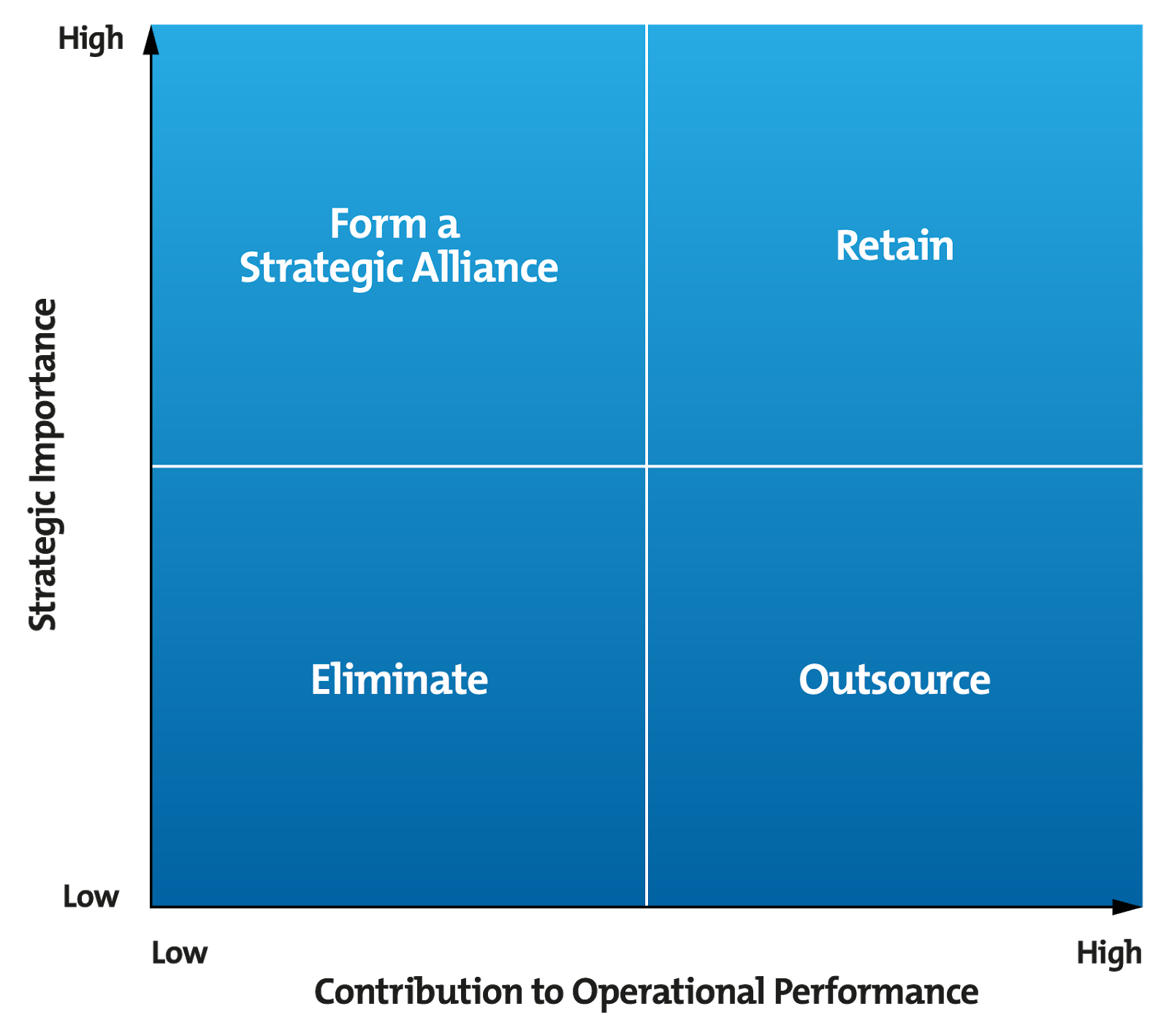Making Software Outsourcing Great Again
The term “outsourcing” has managed to develop a bit of a bad rep for itself, perhaps not entirely undeserved in some areas. It’s become somewhat synonymous with exporting American jobs overseas for cheap labor, resulting in sweatshops, terrible working conditions, and backbreaking work that doesn’t tend to shed kind light on the company benefiting from this outsourced work.
We’re not here to talk about a begrudged history, though. We are here to talk about software development outsourcing. Be those accounts as they may, they’re a type of outsourcing that bears zero relevance to the world of software development. Software outsourcing is a reclamation of a business venture that benefits all parties, employs skilled workers, and drives competitive, ethical practice.
Ensuring the success of an outsourcing project needs a lot of preparation. The impact that software outsourcing can have on the development of both product and outsourcing companies is a voice that deserves to be heard and understood. As the saying goes, outsourcing software development should be made great again in an authentic form.
Pros and Cons of Outsourcing Software Development
It should come as no surprise that outsourcing software development isn’t immune to the whims of balance. Hiring software development outsourcing companies is not going to be the perfect solution to all your problems without any drawbacks. There’s not a single system on Earth that can boast those sorts of numbers. Like any other business solution, there are pros and cons of outsourcing software development.
Perfect or not, outsourcing software development is how businesses grow and thrive. Keeping your projects close to the chest may mean they’re under your constant, in-house control, but how many do you really need to keep your eyes on? Sometimes you need to take a step back to gain a new objective perspective.
Which software can you ship off to another company to work on? Which software development projects are so important that you can’t trust an outsourced company to have control over? Think of it as you’re trimming the rose bush to promote a healthier company, while creating a cost-efficient organization in the process.
Outsourcing software development is an opportunity to form a mutually beneficial partnership, leading toward new innovations, increased production, and maintaining an undisturbed degree of high-quality products.
iTexico has always pursued this very ideal, that outsourcing is the key for a company’s better tomorrow and strives to achieve that goal in every conceivable fashion. This includes, especially if this is your first foray into outsourcing software development, ensuring you have a full understanding of both the advantages and disadvantages.
We’re going to provide you with an understanding of both the pros and cons of outsourcing software development. An informed opinion is the best first step taken toward building a lasting, effective partnership with an outsourcing company. A blind first step, after all, is a risky one indeed.
Deciding Between Outsourcing Companies
Researching all of the best software development outsourcing companies, and picking the best one for your projects is an important step in the process, but for now? Set that aside, you can come back to it later. We’re not interested in choosing between developers, we’re dissecting which projects you should be outsourcing and which ones you should be keeping in-house.
That’s the pressing question, isn’t it? How do I decide which projects are best left in another company’s hands? At face value it seems like it can make for a tough analysis. Then again, we’re all about dissecting right now. You need to break down the value of these software development projects in order to get a handle on where they should be delegated to.
In this instance, the best judgment is broken down into two simple concepts:
- Strategic importance
- Operational performance impact
When you’re considering a project’s strategic importance, you’re taking stock of how it gives your company a competitive advantage. Will this project distinguish you from your competition in a meaningful way? Are you developing something that is unique to your company? Producing innovative products that adhere to your core competencies in a cost-effective manner usually indicate strategically important products.
Software development projects with high operational performance impact, on the other hand, are more relevant to ensuring how well your company runs. Does it increase operational efficiency? Will doing it poorly result in major disruptions to your productivity? These projects may not be innovative, but they’re cornerstones of maintaining your business.
Here’s a graph to help visualize how these factors determine whether you should outsource a project or not.
Outsourcing Decision Matrix

Source: Mindtools
This graph will help you guide through the challenging decision-making process determining which projects should be sent off to outsourcing companies, which should stay in-house, and which can be safely axed altogether.
Form a Strategic Alliance
Starting with the first quadrant in the upper left, these are projects that fall into a category of high strategic importance without contributing much to operational performance. These are the sorts of projects that give you an advantage over your competition and won’t negatively impact your company’s productivity.
These projects are safe since, if they’re done badly, they won’t throw too big a wrench into your business’ gears. However, you may not want to fully outsource these types of software development projects because these projects deliver on high strategic value. The best option here is opting for a strategic alliance with another company.
With two companies pooling their resources toward a common goal without sacrificing their autonomy, the project can be effectively streamlined. Outsourcing, by comparison, generally involves turning over much more authority on a project to a qualified outsourcing company.
Retain
The next quadrant in the upper-right categorize the projects that you absolutely must keep in-house. These projects carry the most weight for your company, both as products of strategic importance and in bearing considerable impact on your work’s operational performance. Therefore, outsourcing these software development projects is not recommended. In these instances, the best course of action is to retain these projects so that you can devote your full attention to their success.
You’ll often find that these projects related directly to your company’s core competencies. These are an organization’s strongest qualities that determine productivity, quality, cost-effectiveness, and so on. Leaving the control of these projects in another company’s hands is generally a bad idea, like leaving your heart surgery in the hands of a mechanic.
Eliminate
Projects that fall into the bottom left quadrant are the opposite of “retain” projects. They’re the sort of work that doesn't bear much leverage in the business game over your competitors while also not being critical to keeping your company running smoothly.
Most of the time these can be axed safely without leaving an impact. However, before finalizing that sort of decision, it’s worth examining the effects these projects have that may carry alternative benefits. A project may not bring much to the table related to your company’s success, but if it’s relatively inexpensive and still offers improvements in employee satisfaction, you may want to consider keeping it.
That’s only one hypothetical, however. Everything you end up working on a part of the company is diverse, and each has their own sense of importance. What may be an inexpensive benefit to one company may just be a drain of resources for yours.
Outsource
This final quadrant in the bottom-right covers the most important aspect for this article: outsourcing. These types of software development projects are important gears for keeping the company machine turning.
That is why you should outsource software development if anything falls into this category is best outsourced to another company. They’re equivalent to chores in the sense that they need to be done for everything to run smoothly, but you have more important things to worry about. By outsourcing these software development projects, you can focus on your core competencies and “retain” projects that drive your business’ growth.
Different Types of Outsourcing
If you opened a book and randomly choose an outsourcing company, you’re almost certainly going to wind up with the wrong company. Before outsourcing your software development work, you need to make sure you’re choosing the right type of outsourcing work as well as an appropriate company to work with.
The different types of outsourcing are as follows:
- Professional
- Manufacturing
- Project
- IT
Each type comes with their own pros and cons, as all things do. Make sure you weigh these criteria with each outsourcing company before diving in headfirst.
Professional Outsourcing
This is the most common form of outsourcing that most people take advantage of already, perhaps without even knowing it. Whenever tax season rolls around, if you hire someone to do that work for you, then you’ve personally outsourced yourself. For companies, they’re going to be more interested in legal, accounting, purchasing, and administrative jobs. They’ll take care of menial tasks, like finances and bookkeeping, that don’t warrant the company’s full attention.
Pros:
- High cost savings
- Reduces overhead costs
- Global access to talent
- Ease of employment handling
Cons:
- No exclusivity
- Potential job loss
Manufacturing Outsourcing
This type of outsourcing bears next to no relevance to software development, as manufacturing outsourcing is intended for companies that manufacture physical products. Cars, toys, clothing, posture correctors, anything that can be mass-produced in a factory falls under special consideration for outsourcing. Whenever you wear a shirt with a tag that says “Made in China,” then you’ve got an outsourced product on your hands.
This is the same type of outsourcing that’s managed to give the entire concept a bad image in the public mind. As cost-efficient as it is, the ramifications end up being sources of mass criticism for the product companies that employ it.
Pros:
- Cost savings
- Efficiency
- Innovation support
Cons:
- Economic impact
- Ethics
Project Outsourcing
If you ever wind up having a small project that needs to get done, project outsourcing will usually get the job done for you. Sometimes you don’t need to pull together a full in-house or outsourced team to get something finished, like writing a book, designing a website, or developing an email campaign. In these instances, a smaller project may only need a single worker to get a single, short-term project completed.
Pros:
- Cost savings
- Expertise
- Quality
- Quick turnaround
Cons:
- Time management
IT Outsourcing
For software development, the only type of outsourcing that’s actually relevant is IT outsourcing. Whether you’re developing a new app or a custom piece of software, chances are you’re going to need to delegate a bit. Not every project needs to fall under your watchful eye, and finding a reliable outsourcing company through iTexico may net you the cost-effective results you’re looking for.
Pros:
- Cost savings
- Highly qualified
- Quickly implement new technology
- The ability to focus on other tasks
Hiring another company to work on one of your projects is going to be much more cost-effective than doing it in-house. Offshore and nearshore outsourcing companies charge a fraction of the cost that a domestic company might.
Not only are they cheaper, but they’re USMCA-certified, meaning they’re guaranteed to deliver a high-quality product from skilled workers that’s comparable to Canadian or U.S. standards. These highly focused teams can devote all their time, energy, and resources to your project, meaning quick turnaround and implementation.
In the meantime, while they’re working, you can focus on other projects that demand in-house attention. The time saved from recruiting and training a new team to focus on this project saves you an enormous amount of expenses that might have otherwise chipped into your profits.
Cons:
- Language barrier
- Time difference
The issue with offshore software development and/or nearshore software development, of course, is that the companies are going to be from different countries. That means they may be in different time zones, and English is not guaranteed to be a strong secondary language.
Working with iTexico, however, guarantees that not only will you be able to work with skilled, affordable team members during your business hours, but the language barrier is nothing more than a small hurdle that’s been dealt with time and time again.
Making Software Outsourcing Great Again
The future of the world lies in globalization. Rather than staying isolated within our own country, having the capability to spread out and pull from resources around the world has opened new frontiers in software development.
India is no small example of how effectively the IT field has grown due to this megatrend. They capitalized on the outsourcing field early-on, creating a booming labor market for their country that’s lasted years. However, as labor markets continue to grow, it’s become easier to find new labor markets that boast comparable pricing and high-quality labor.
India’s Achilles heel was being halfway around the globe. Now, other options mean that companies no longer have to deal with long delays and constant rework intrinsic when dealing with outsourcing companies on the other side of the earth.
At iTexico, we aim to bridge the continental gap with our “Nearshore Plus” model, which locates software delivery teams in Mexico, providing time, culture, and speed benefits. As we shared in this previous article, Mexico offers a myriad of outsourcing advantages which include:
- The addition of nearly 10,000 technical and engineering graduates each year to the Mexican IT workforce;
- The country’s commitment to more than 50 technology innovation parks and incubators, which has lured more than 1,200 companies to locate key technical resources in the nation, and;
- Technological innovation cities like Guadalajara or Aguascalientes.
Here at iTexico, we encapsulate these advantages into the seven Cs on how Nearshoring in Mexico is making outsourcing great again. For more information about this topic, we recommend this article.
If we can be of any assistance to you in considering whether partnering with an outsourcing company is right for you, please reach out.




Post Your Comment Here